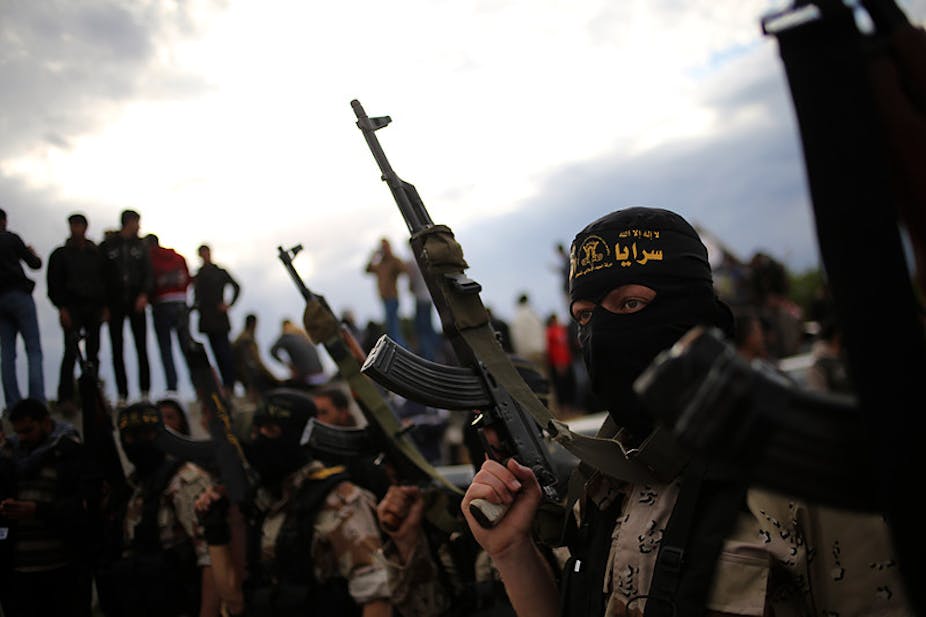British support for opposition groups fighting against the Assad regime in Syria has waned considerably since the summer of 2013, with the increasing prominence of more radicalised Islamic organisations such as ISIS in that conflict. With this conflict now spilling over to Iraq and the hundreds of UK citizens embroiled in the fighting, identifying who is actually a terrorist and a threat to the UK is becoming more difficult than ever.
The police and intelligence services have warned about the potential threat posed by individuals returning to the UK from these conflicts – but there is no easy way of identifying which returning combatants are “radicalised” and which ones are not.
The enemy of my enemy
Earlier this year, Mashudur Choudhury became the first Briton convicted of terrorist offences related to the Syria conflict. Choudhury was never actually accused of being a threat to the UK, but this was not necessary; the British definition of terrorism covers not only acts of terrorism against the UK but also, as clarified by the Court of Appeal in an earlier case, against all governments – including those that are non-democratic or tyrannical.
But by taking this line, the UK is prosecuting individuals for fighting against a regime the British government itself sought to confront with military action less than a year ago. Indeed, the Libyan combatants that NATO assisted in the 2011 military intervention against Gaddafi’s regime also potentially fitted the definition of terrorism to which Choudhury was held.
This contradiction will have to be directly addressed. Given the sheer number of UK citizens now apparently fighting in Syria, Choudhury will not remain an isolated case for long.
As things stand, the hundreds of UK citizens expected to return home from fighting in Syria and elsewhere could all expect to be prosecuted, since they are all potentially terrorists under UK law. British prosecutors, therefore, will soon be left on the front line .
Leaving it to the lawyers
In deciding whether to bring terrorist charges against an individual, prosecutors and police may very well be taking into account whether an individual does pose a risk to the UK, but this is not an explicit requirement of the legislation. While prosecutors should certainly consider whether bringing a case to court would be in the public interest, assessing whether an individual is or is not a terrorist is much more political than that.
Indeed, an argument could very well be made that it is in the public interest to deter others from travelling to armed conflicts around the world. Choudhury’s prosecution certainly suggests that the Crown Prosecution Service is taking this route.
Yet while many combatants may harbour no ill will towards the UK, a security crackdown that impacts adversely on one section of the community would be counter-productive. For a salutary warning, we need only look to the effects of internment in Northern Ireland in the 1970s, which was used almost exclusively against the nationalist Catholic community, disenfranchising many and actually increasing support for the IRA.
But it is not clear that these are the sort of considerations lawyers should be agonising over. The Supreme Court signalled in 2013 that relying on prosecutorial discretion to hone the definition of terrorism is undesirable – even while shrinking the definition could be crucial to avoid conflict with international humanitarian law.
And even if it were proven effective in purely practical terms, relying on prosecutorial discretion to classify which returning fighters are terrorists means parliament has delegated what should be a legislative problem to the legal system – relieving the government of a highly sensitive and pressing responsibility.
Urgent task
Limiting the definition of terrorism solely to threats against the British government could be contra to international law and to the UK’s obligation to combat international terrorism. There is no internationally agreed definition of terrorism and the issue of whether or not to classify self-declared “freedom fighters” as terrorists is a major sticking point. The UK’s current legal definition of terrorism appears to make no distinction between terrorist and freedom fighter, even though the government clearly uses such distinctions to inform foreign policy and military action.
The decision of whether to prosecute specific individuals will of course largely hang on what credible evidence is available (if any). But the more political factors that will also affect the decision are a matter of serious concern.
Norms of due process and fair procedure arose precisely to save the justice system from show trials motivated by political considerations. For the system to function impartially as intended, it is crucial that prosecutors can work without being subject to any political imperative. But politicians have left it to lawyers to walk the tightrope between prosecuting purely in the public interest and making intensely political decisions of who exactly is a terrorist.
With both the Supreme Court and the Independent Reviewer of Terrorism Legislation signalling that the definition potentially needs reviewing, parliament will have to take up the task of reforming our counter-terrorism laws soon. If it fails to do so, the return of the hundreds of Britons fighting in the Middle East will be guaranteed to prove troublesome.

